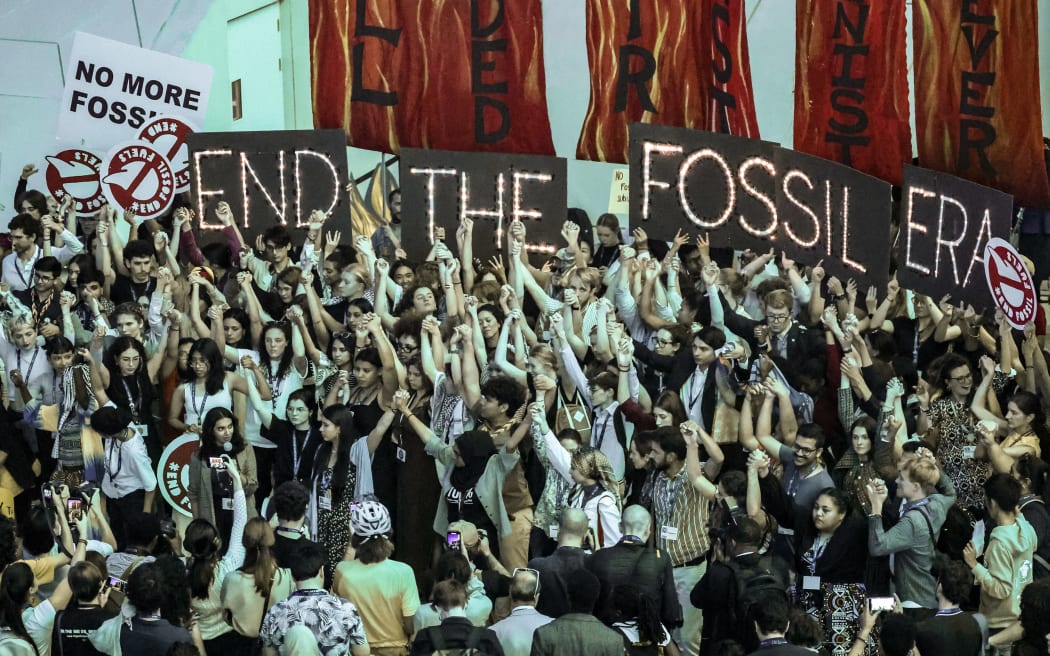Pacific campaigners not happy with COP28 deal
Thursday 14 December 2023 | Written by RNZ | Published in Pacific Islands, Regional

Young activists stage the last protest in COP28 conference venue as the UN Climate Change Conference comes to an end, at the Dubai Exhibition Center, United Arab Emirates on 12 December, 2023. Photo: Dominika Zarzycka / NurPhoto / NurPhoto via AFP/23121324
Pacific climate leaders have criticised the new COP28 deal, released overnight after marathon negotiations.
The deal calls on all countries to move away from the use of fossil fuels but doesn't include "phase out" language.
COP28 president Sultan Al-Jaber called the deal "historic" but added that its true success would be in its implementation.
"We are what we do, not what we say," he told the crowded plenary at the summit. "We must take the steps necessary to turn this agreement into tangible actions."
Al-Jaber said the agreement was a robust plan to limit global temperature rises to the goal set in Paris of 1.5 degrees Celsius.
The Alliance of Small Islands States (AOSIS) - which includes 15 Pacific Island nations - lead negotiator Anne Rasmussen from Samoa said the group was not in the room when the decisions were gavelled.
Rasmussen said the 39 states were coordinating themselves and walked in during the standing ovation that followed the decision.
"The course correction that was needed has not been secured," she said.
Marshall Islands' head of delegation, John Silk said, "the fact that the decision was gavelled without a major group in the room, which represents one of the most vulnerable groups in the world, is unacceptable".
"I came here from my home in the islands to work with you all to solve the greatest challenge of our generation.
"I came here to build a canoe together for my country. Instead we have built a canoe with a weak and leaky hull, full of holes.
"Yet we have to put it into the water because we have no other option."
The draft prior to the final text had weaker language around fossil fuels.
It included a list of the eight options that countries "could" use to cut emissions, including: "reducing both consumption and production of fossil fuels, in a just, orderly and equitable manner so as to achieve net zero by, before, or around 2050".
The AOSIS chair likened that draft to "signing our death certificate".
A statement from AOSIS on the new text said it was an improvement but does not do enough to limit global warming to 1.5C.
"In terms of safeguarding 1.5C in a meaningful way - the language is certainly a step forward; it speaks to transitioning away from fossil fuels in a way the process has not done before," the statement said.
"But we must note the text does not speak specifically to fossil fuel phase-out and mitigation in a way that is in fact 'the step change that is needed'."
The statement said there were loopholes and there was no invitation for parties to peak emissions by 2025.
"We reference to the science throughout the text but then we refrain from an agreement to take the relevant action in order to act in line with what the science says we have to do."
Pacific Islands Climate Action Network regional coordinator Lavetanalagi Seru said the outcome had signalled that "the days of the fossil fuel industry is numbered" but again was only an incremental step in the right direction.
"This outcome continues to allow for dangerous distractions and loopholes, such as carbon capture, nuclear, and removal technologies, and weakening language on gender, human rights, indigenous rights, which is deeply disappointing."
- RNZ














































